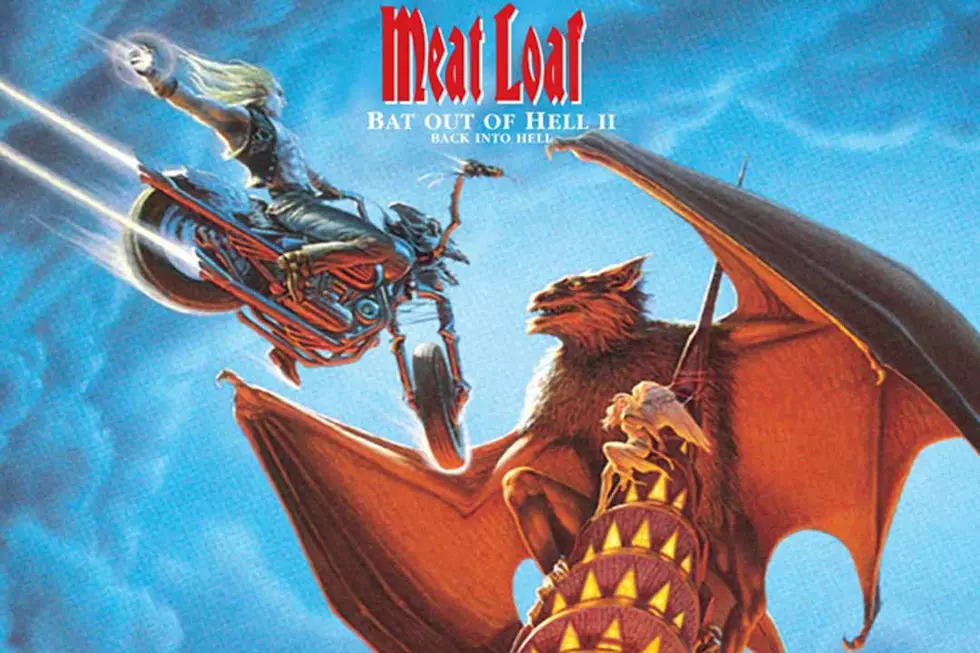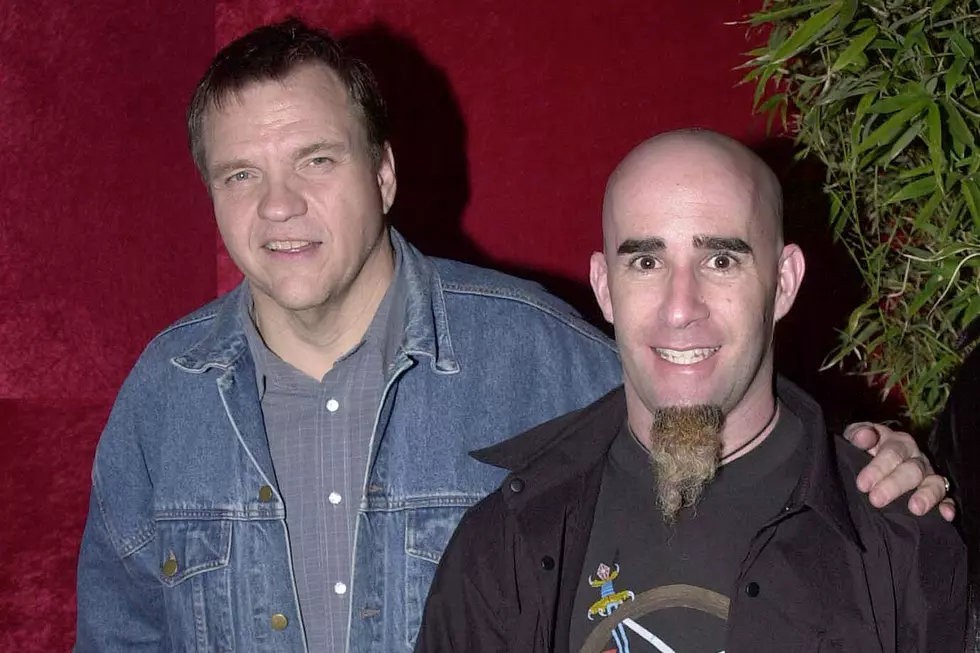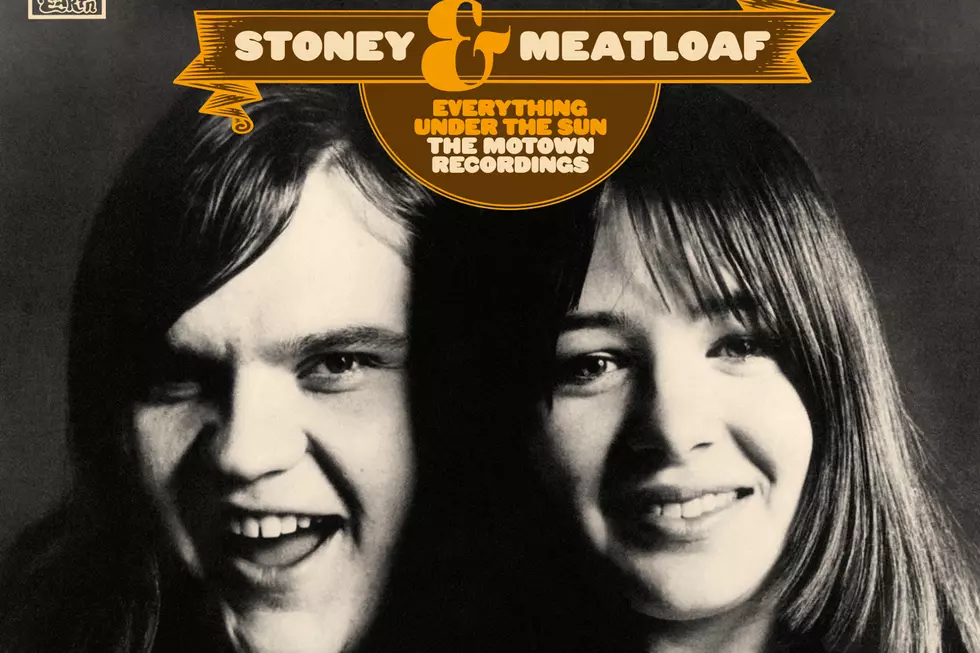
The Last ‘Real Record Man’ Fights the System: The History of Steve Popovich and ‘Bat Out of Hell’
Meat Loaf's 'Bat Out of Hell' is one of the most wildly profitable rock albums of all time. So how did the people most responsible for its success end up being cheated out of their hard-earned payday?
A lot of rock fans think of record company executives as being greedy, cigar-smoking villains like the guy on the cover of Warrant's 'Dirty Rotten Filthy Stinking Rich' LP. It's easy to forget that there are good guys in the industry, too -- and that they're sometimes down the food chain from high-level corporate bean-counters who are just as ruthless and unscrupulous as any two-bit crook. Cleveland International founder Steve Popovich is a classic example.
Popovich founded the Cleveland International imprint with seed money from CBS, after a successful stint with the company's promotion and A&R departments in which he proved instrumental in breaking hit records for Boston, Cheap Trick, Ted Nugent, and many, many others. As head of Cleveland International, Popovich gave Meat Loaf the break he needed after years of enduring rejection from label bosses who didn't understand what he and his partner, songwriter Jim Steinman, were trying to do. Although Popovich later admitted that it wasn't exactly love at first listen for him with 'Bat Out of Hell,' he eventually heard something he liked -- and something unique he thought was missing from the rock landscape.
"It was the day and age of the wimpy-looking, Peter Frampton-types," Popovich later recalled. "Then here comes Meat Loaf, this huge guy with an amazing voice." Thanks to his CBS connection, Popovich was able to broker a distribution deal between Loaf and the conglomerate's Epic imprint through Cleveland International.
"Steve said, 'You wanna go with Epic?'" Loaf recalled in a 1978 interview with NME. "Now, Epic I've been trying to get with for 10 years. Just because I like the name, no other reason. Think of the name: Epic Records. It's great. I really like the name Epic. I did Ted Nugent's album, because it was on Epic. I did about four demos for 'em as well but nothing came of it. At the time they were like everyone else, they couldn't hear the sound I wanted. Record company people kept telling me I wasn't rock 'n' roll; they said, 'We don't wanna hear it, it's Broadway music.' That's bulls---. I've done about 10 shows on Broadway so I know what I'm talking about; you don't hear music like ours. Anyway, in the end CBS/Epic offered us quite a bit more money than Warner Brothers so ... we went with Epic, naturally."
Meat's Epic audition -- and those Nugent sessions -- were done with producer Tom Werman, who recalled the experience in an exclusive interview with Ultimate Classic Rock: "I was just talking with someone two days ago about how A&R men used to have pianos in our offices, and I used as an example the time Meat Loaf and Jim Steinman came in. Steinman played the piano, Meat Loaf sang, and the walls came down," Werman said, laughing. "I said, 'Jesus, you're incredible, but I don't think we can do anything with you.' I was complimentary, but it was pretty theatrical next to what we normally did. I don't know if I was right or wrong, but Steve got very enthusiastic about things. Very. He picked it up and ran with it."
"He was one of the true believers," Steinman later said of Popovich in an interview posted at his site. "He heard the record and didn't need to know anything else. As I was told ... Popovich's comment I got was 'All I had to hear was the introduction to 'You Took The Words Right Out Of My Mouth.'' It's the best introduction in rock and roll I've ever heard, it's about 12 seconds, and he loved that introduction. I'm sure he listened to the rest but that's what I remember. That's when he decided to buy the record."
Epic gave Loaf and Steinman the deal they'd been looking for -- including the freedom to stick with producer Todd Rundgren, whose involvement proved the sticking point that scotched earlier negotiations with one indie imprint. Still, even though Popovich had helped generate some major hits for the company, neither Cleveland International nor Meat Loaf were immediate priorities for CBS. At the time, Popovich's label had only been responsible for a handful of low-charting singles, including Ronnie Spector's E Street Band-assisted cover of Billy Joel's 'Say Goodbye to Hollywood,' and he found it difficult to wrest major promotion dollars from Epic -- but that didn't curb his dogged determination.
"Popovich is the one who saved us," continued Steinman. "He brought it in as Cleveland International because CBS couldn't turn it down then. He had the right to sign it. It was sort of assumed that we would sell nothing, you know, except 10 copies in Cleveland. It was amazing. Again, a great lesson in the record industry: If you have one believer you can get much further than you can with all of Sony or all of Warner Brothers sort of having some interest. You have to have one fanatic believer. This guy was a fanatic believer, and all he did was have faith in it. He built it step by step with like one station in New York, one station in Cleveland -- and he believed, as I did, that if people heard it, it would catch on. I had no idea it would take about a year to catch on in America. It was one of the strangest stories ever for a record. It became huge overseas before America. In fact, it's the first record I think ever that sold, American record, that sold something like five million overseas before it even sold 400,000 or so here. We were like platinum in 12 countries overseas and no one even knew who we were here."
But even once the sales started kicking in, that didn't mean Cleveland International was suddenly flush with cash. In fact, as Popovich pointed out in a 2006 interview, "By the year 1982, six years after we started the company, we had sold 10 million records, and we were in the hole $6 million, because CBS had advanced us the dollars to sign and market and promote -- the overhead. Nobody gives you those dollars for free, but the difference in the record industry is when you pay them back, you pay them back 400 times what you borrowed, and they still own your house: These two evil words called cross-collateralization."
Cross-collateralization is a complicated-sounding term that might not be familiar to most people not involved with royalty-based businesses, but what it basically boils down to is a company's right to recoup monies invested by pulling profits across the board. Imagine you're an artist who scores a huge hit record out of the box, and under the terms of your contract, the label has an option to release three more -- each of which flop badly. Under the terms of a standard contract, the label will recoup every penny spent on all of those albums, including advances and promotional expenses, before the artist sees any royalties. Unless cross-collateralization is explicitly prevented in the deal, that one hit record becomes the artist's only means of paying off a substantial debt incurred over the release of multiple albums. Even if those less successful releases go out of print, their expenses stay on the books, making it harder to get in the black. In this case, Cleveland International and Meat Loaf were in essentially the same sinking boat.
(As an example of how hard it can be to recoup, consider the case of Christopher Cross, whose 1980 debut was a multi-platinum, Grammy-gobbling smash, while subsequent releases saw him spiraling into obscurity. As Cross later told this writer, his manager Irving Azoff had the foresight to prevent cross-collateralization against the first record; when his third and fourth albums, 1985's 'Every Turn of the World' and 1988's 'Back of My Mind,' flopped and were taken out of print in the U.S., he had to pay off his Warner Bros. balance mainly through sales of his second release, 1983's 'Another Page' -- meaning he didn't see any royalty money from that album until at least the late '90s.)
Cleveland International shut down in the early '80s, and Popovich resumed his A&R career, but with the advent of the CD in the mid-to-late '80s, catalog sales spiked, and he found himself out of that $6 million hole with CBS -- although he strongly suspected that the company had systematically shortchanged him in its accounting reports. Aware that there was a two-year statute of limitations on ordering audits of those statements, Popovich regretted not taking the company to task earlier; fortunately, he had an ally in Walter Yetnikoff, who'd worked closely with Popovich in the '70s and had risen to CEO of Sony Music Entertainment, the conglomerate that resulted from Sony's purchase of Columbia/CBS in the late '80s.
Yetnikoff's crucial role is outlined in a long, brutally insightful account of Popovich's battle soon to be published in an expanded edition of the classic record biz book 'Hit Men: Power Brokers and Fast Money Inside the Music Business,' recently excerpted by Billboard. During a 1990 meeting with Yetnikoff, Popovich recalled: "I said to Walter, 'To the day I die, I'll regret I didn't audit.' And Walter said, 'So audit.'"
Thus armed with a waiver against the statute of limitations, Popovich mounted a legal crusade against Sony that, while successful in unearthing a litany of ghastly misdeeds on the company's part, also ended up becoming a perfect example of how difficult it is to wrest money from a major corporation even after the courts have awarded damages. After hiring an accounting firm to pore over Sony's statements, Popovich filed a $100 million lawsuit against the company in 1995 -- and then watched Sony's legal team stall for three years while lawyers' fees drained his bank accounts. Sony fought him at every step, including his demands that future pressings of 'Bat Out of Hell' restore the Cleveland International logo, before the two sides eventually worked out a multi-million dollar settlement.
Unfortunately, Popovich's battle was far from over. As outlined in the 'Hit Men' excerpt from Billboard, "he discovered that Sony, despite the agreement, did not have any intention of putting his logo back," and filed another lawsuit for breach of contract and fraud in 2002. That case didn't go to trial until 2005, by which point Popovich was nearly wiped out. He again walked away with a legal victory, awarded more than $5 million in damages -- which Sony promptly appealed, drawing things out even further.
In the meantime, the label had mended fences with Meat Loaf, who'd had his own royalty-derived grievances with the company. According to the 'Hit Men' excerpt, execs even went so far as to try and pit Meat against his biggest early advocate: "Sony ... had settled privately with Meat Loaf, and used him as a star witness against Popovich." Reached for comment by Ultimate Classic Rock, he had to decline an interview due to travel commitments, but he vigorously contested this claim through a representative, who told us flat out that "the statement he testified on Sony's behalf is a lie."
After years of doling out legal fees, Popovich grappled with serious money woes, and his efforts to get influential friends like Clive Davis to talk sense into Sony proved fruitless. But in a touching turn of events that speaks volumes about his character, he was pulled back from the financial brink by a gift from E Street guitarist Steven Van Zandt -- who, as legend has it, was pivotal in convincing Popovich to sign Meat Loaf in the first place. Popovich later credited Van Zandt's generosity with saving him, saying, "When I was dead f---ing broke, Steve gave me 50 grand, and he never let me pay him back."
By 2007, the case was back in front of a judge, and yet again, Sony lost -- with a judge ordering the company to pay Popovich $5.7 million. "I worked too hard for them and made them too much money to get robbed now, in the autumn of my life," he told reporters following the trial. As he put it in 2005: "I deeply resent the lack of respect for history. I want something that my grandkids can say, 'Yeah, my grandfather did that.'"
And yet, according to Popovich's accountants, Sony was still guilty of underpaying him. According to the 'Hit Men' excerpt, a 2009 audit "left many questions unanswered, including exactly how many copies of 'Bat Out of Hell' had been sold. Some estimates have gone as high as 43 million, surpassing even the Eagles' 'Greatest Hits 1971-1975.'" Recommending a more in-depth accounting, a member of the firm wrote to Popovich saying: "Prior to the audit report, you believed that Sony was sending you false, fraudulent and misleading semi-annual royalty statements. After the audit report, you know that Sony is sending you false, fraudulent and misleading royalty statements, but you still do not know the extent of the understatement of royalties due you."
Sadly, he'd never find out. Popovich died in June of 2011 at the age of 68; as the book puts it: "He had had a history of heart trouble, but the stress of the Sony litigation was a likely contributing factor to his death." Sony eventually reached an undisclosed settlement with the Popovich estate, closing the book on further legal action and finally bringing the long, sordid story toward some measure of closure.
Regardless of whatever money finally ended up changing hands, Popovich's story stands as a cautionary tale for anyone hoping to make a living with their art -- or dedicating a career to helping others hit the big time. As Tom Werman put it in his conversation with UCR: "It's really too bad, because Popovich gave most of his life to that company. It's rude." But through it all, Popovich's surviving family members can at least take solace in the knowledge that his reputation as one of the industry's few good guys remains intact.
"Believe it or not, there was actually a time, before corporate takeovers and the all-consuming concern with the bottom line, when the music business was run by people who actually knew, loved, and cared about music: the real record men," wrote legendary Cleveland singer-songwriter and radio personality Michael Stanley in a post following Popovich's passing. "Steve Popovich was the last of the real record men ... and the best! Rock on, brother."
More From Ultimate Classic Rock









